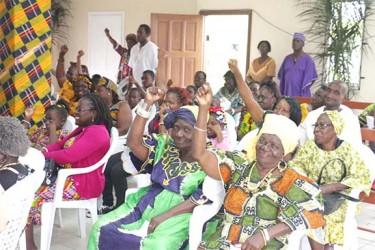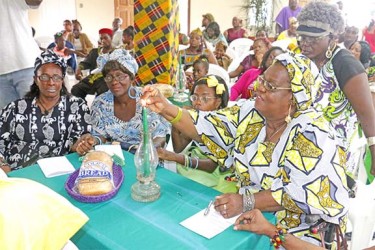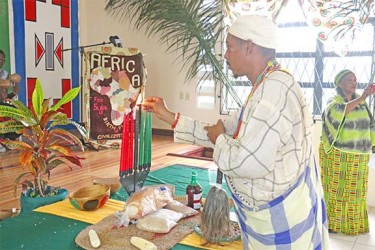The African Cultural and Development Association (ACDA) yesterday paid tribute to the late South African Leader, Nelson Mandela, during a brief Kwanzaa ceremony held at its headquarters at Thomas Lands.
Kwanzaa, which was founded in 1966 by Maulana Karenga, is celebrated annually from December 26th to January 1st. The theme for this year’s celebration is “Celebrating and Living Kwanzaa: Sowing and harvesting seeds of good.”
Executive ACDA member, Clementine Marshall, said that after the event held at ACDA’s headquarters, another event is scheduled for today at Mahaica, West Coast Berbice. The main event, dealt with the first of seven Kwanzaa principles “Umoja” which is Swahili for “Unity”. The second principle “Kujichagulia”- meaning Self-Determination, will be celebrated with a simple ceremony at Calcutta, Mahaica. Marshall said that Kwanzaa is a growing event across Guyana and while they don’t have venues for the celebration of all seven principles, namely, Ujima (Collective Work and Responsibility), Ujamaa (Cooperative Economics), Nia (Purpose), Kuumba (Creativity) and Imani (Faith), they hope to expand the activities next year.

At present a location is being sought in Linden for Kwanzaa celebrations. Marshall reflected on the past sixteen years, Kwanzaa has been celebrated in Guyana. Marshall said that the first Kwanzaa event was held at the North Ruimveldt Multilateral School on Mandela Avenue. After a moment of silence for Mandela, Eric Phillips, ACDA member, urged that Africans go back to their roots. He said that farming and other traditional practices should be reinvented and added that persons should learn to pool their resources and invest in order to improve their standard of living.

The ceremony concluded with the lighting of the seven candles, each signifying the seven principles and the seven days that Kwanzaa is celebrated for. A book of condolence was also signed by guests at the event.
Kwanzaa symbols, a decorative mat on which other symbols are placed, corn and other crops, a candle holder with seven candles called a kinara, a communal cup for pouring libation (a ritual sacrifice of a liquid), gifts, a poster of the seven principles and a black, red and green flag, were on display at the event.










